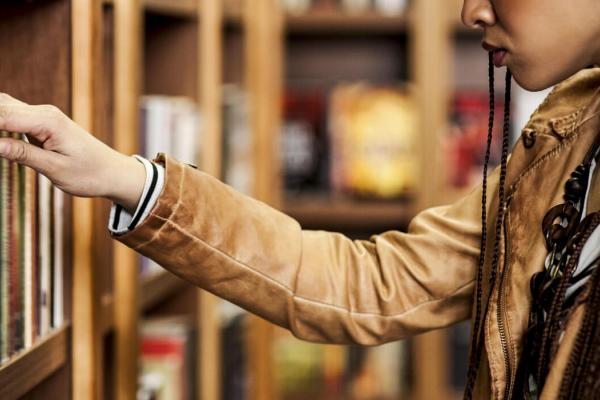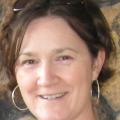PRIOR TO THE ELECTION, I read J.D. Vance’s best-selling memoir, Hillbilly Elegy, in an attempt to understand Trump’s appeal to lower-income white Americans. However, this didn’t prepare me for the 81 percent of white evangelical Christians, some of them my extended family members, who cast their ballots for, it seemed to me, religious intolerance, misogynistic policies, environmental neglect, and white privilege. On Nov. 9, 2016, I awoke to find not just a world divided between Democrats and Republicans, but two versions of Christianity at odds with one another. Clearly, I had missed something.
Once initial shock over the election results subsided, I began purchasing books—stockpiling them. Perhaps I could build a wall of literature for protection, one of those enormous noise barriers separating residential neighborhoods from freeways, something to block out the racism and bigotry I assumed were behind the election results. What did theologians have to say about these topics? How had previous generations faced authoritarian threats? I searched progressive Christian reading lists: Howard Thurman’s Jesus and the Disinherited, Drew G.I. Hart’s Trouble I’ve Seen, Dietrich Bonhoeffer’s The Cost of Discipleship ... The list grew. I couldn’t stop. Amassing these titles and stacking them higher made me feel righteous. I began referring to them as my “resistance library.”
Existing titles from my bookshelves joined new acquisitions to form adjoining soundproof panels. Some portray a radically different God from the one with whom I grew up: Marcus J. Borg’s Meeting Jesus Again for the First Time, Walter Brueggemann’s The Prophetic Imagination, and Scott W. Gustafson’s Behind Good and Evil. Rachel Held Evans’s memoir, Faith Unraveled, details how she moved away from fundamentalism. Her faith journey mirrors parts of my own. After further rearranging within my bookcases, I erected another section dedicated to world religions. God Is Not One, Stephen Prothero’s book on eight world religions, sat next to Reza Aslan’s primer on Islam, No god but God, and the biography Mormon Enigma: Emma Hale Smith.
Surrounded by all of these words, I felt fortified. I could safely clench my fist around any book and shake it at the 81 percent to assert that my definition of Christianity was valid. Was that the point, though? Were books weapons, walls to divide people, or rather gates through which we explore ideas about God?
My unease grew as I sat in church one Sunday and listened to a reading from Isaiah 58:4: “Look, you fast only to quarrel and to fight and to strike with a wicked fist. Such fasting as you do today will not make your voice heard on high.” God was addressing the Israelites after their return from exile in Babylon, but the part about the fist sounded familiar. In my anger, I had become sanctimonious about my reading.
My wall seemed to crumble a little more as I listened to verses 6 to 8: “Is not this the fast that I choose: To loose the bonds of injustice, to undo the thongs of the yoke, to let the oppressed go free, and to break every yoke? Is it not to share your bread with the hungry, and bring the homeless poor into your house; when you see the naked, to cover them, and not to hide yourself from your own kin? Then your light shall break forth like the dawn, and your healing shall spring up quickly; your vindicator shall go before you, the glory of the Lord shall be your rear guard.”
My collection wasn’t meant to browbeat others. If I participated in the discipline of learning to enlarge myself while shaming others, I’d missed the mark. True service to God involved the good of the community, not merely the edification of the individual.
Prior to the election, consuming theological writing had been part of a quest to find a divine love far more inclusive than that the Religious Right had portrayed to me throughout my childhood. It was holy. Turning pages was an attempt to understand different religious traditions, to expand the definition of God, to understand the historical context of Jesus, to relate with the oppressed. It wasn’t about being correct. It was about communication. Through others’ writings, I had experienced a loving, accepting God. My resistance library could be a means to share this good news with others.
In the following weeks, I posted book titles and pictures through social media and asked for recommendations. I’ll admit it still bordered on the boastful side. Yet the action engaged me in a larger conversation. Several friends weighed in with comments on books they enjoyed or suggestions for future study.
I belong to an Evangelical Lutheran Church of America congregation in Reston, Va., that concludes each service with the benediction: “Go in peace to celebrate, think, and serve.” Our community fosters discussion about theology and social justice. One Sunday, I bundled up some books and took them to church, where I loaned out a few to fellow members, including my pastor. My hope is that we can talk about the state of Christianity in the United States. If enough people are interested, we’ll choose a title to read as a small group that meets for an adult forum each Sunday before the worship services. Books might become an entry point into important exchanges.
Reading books that affirm my view of an inclusive God was only a first step. Christ calls us to stand with the oppressed by listening to their accounts. Beyond exploring issues of racism and bigotry, my library ought to include titles that tackle divisive topics such as abortion and poverty in nuanced ways. To avoid dwelling in an echo chamber, I even plan eventually to solicit book and article suggestions from those who support the current administration. (Note to my relatives: Don’t send books. I’m not there yet.)
I’ll confess I have yet to make it through even a portion of my recently purchased volumes. This type of reading isn’t always easy. The first chapters of Trouble I’ve Seen evoked a sense of guilt about my white privilege. That response is healthy. I need to be challenged. I want to move beyond my comfort zone. Nonetheless, it wasn’t the best “before bed” reading. I also craved a sense of comfort, something that picking up Rebecca Solnit’s Hope in the Dark accomplished as it reminded me how activism involves seemingly ordinary steps that matter in the long term. Striking a balance in what to read, and when, seems imperative.
While constructing my library, I discovered that reading has been part of my daily practice of holy resistance since long before the 2016 election. My bookshelves reject a narrow God who only loves those who have the correct set of beliefs. Instead of walls, these books are bridges that have carried me over swiftly moving currents of fear and hatred. They have set me free to love rather than to judge. Rereading some of the selections challenges me to unclench my fist and to offer these words up to others as reassurance that God is the source of unconditional love. Although it started out as a reaction to the election, I am hopeful my personal resistance library will become a portal for connecting people of faith and engaging others in conversations.

Got something to say about what you're reading? We value your feedback!

